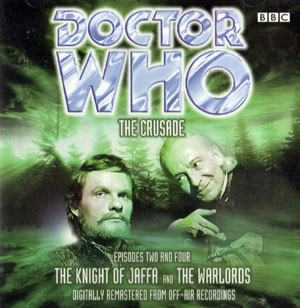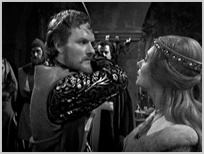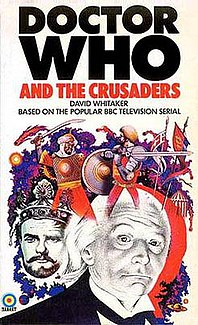Now this is more
like it! After the sci-fi silliness of The Web Planet – a blog for which turned
out to be incredibly divisive, so sorry if you’re a fan and so hated my blog! –
we return to Earth, slap-bang in the middle of 12th century
Palestine, and the third crusade. The Crusade is written by former script
editor David Whittaker, for the first time moving away from the 2-episode
fillers he had been associated with, and directed by the magnificent Douglas
Camfield, who had before now only worked on the third part of Planet of giants, but would go on to
direct some of Doctor Who’s greatest
serials, including The Seeds of Doom and
Terror of the Zygons. This serial is a rich, grand piece,
similar to Marco Polo in tone and
feel, telling of the involvement of the Doctor and his companions in King
Richard’s invasion of Palestine in the name of God.
 From the outset, there is a change in style from the last
serial – the sets are luxurious and rich in design, believable, and the action
kicks off straight away. Upon
introducing the lurking faces of the Palestinian horde, we cut to a wonderful
scene between Richard – played by the magnificent Julian glover, quite a catch
for the time – and his men, discussing the invasion in metaphorical terms with
a beautiful hawk. The dialogue flows
beautifully, and these are the most realistic non-regulars since The Reign of Terror. Each character is given his own nuances
and inflections, rather than start caricature, and we can already see the
danger which lurks beneath Richard’s civilised exterior – he is stubborn,
almost childish, and determined to get what he wants. He waves away the concerns of his men
nonchalantly.
From the outset, there is a change in style from the last
serial – the sets are luxurious and rich in design, believable, and the action
kicks off straight away. Upon
introducing the lurking faces of the Palestinian horde, we cut to a wonderful
scene between Richard – played by the magnificent Julian glover, quite a catch
for the time – and his men, discussing the invasion in metaphorical terms with
a beautiful hawk. The dialogue flows
beautifully, and these are the most realistic non-regulars since The Reign of Terror. Each character is given his own nuances
and inflections, rather than start caricature, and we can already see the
danger which lurks beneath Richard’s civilised exterior – he is stubborn,
almost childish, and determined to get what he wants. He waves away the concerns of his men
nonchalantly.
When we see the TARDIS crew leave their ship, there is a
look of despondency about it all, which is wonderful. Following the harrowing events of the
previous few weeks, Ian looks dishevelled and tired, glancing furtively about
as though desperately trying to avoid trouble.
This is William Russell’s serial, really, and his strand of the
storyline is magnificently delivered by Russell.
Within seconds of the crew arriving in the forest, they are
ambushed, and Barbara is kidnapped. I
feel genuinely sorry for Jacqueline Hill in some respects; it doesn’t seem to matter where they are,
there is always some element of sexual danger involved. Hill is, as always, magnificent, and the
scenes in the harem are wonderful, as are her scenes with Bernard Kay’s
Saladin. His fascination with her, due
to her appearance and posture, as well as her evidently educated stature, is wonderfully
handled, and Hill’s guarded responses are entirely responsible for this.
The fight sequence in the woods is wonderful – after the
awkward posturing of the Zarbi and Menoptra the week before, and their stilted
fight sequences as each had to carefully position themselves due to their
costume, here there is something brutal and guttural about the sequence. There seems to be a genuine, palpable threat
involved. The capture of William,
pretending to be King Richard, is excellently handled – the look of delight on
the faces of the Saracens is perfectly handled, and John Flint’s delivery as
William is equally well-managed; we can
tell that he is terrified, yet is doing what is right for his king. When he and Barbara discuss his false
identity in their cell, the glee he shows is fantastic.
What is fascinating with this particular serial is the way
in which Saladin and Richard are portrayed.
Whereas in The Reign of Terror
certain characters from history had to be allowed to remain as they were, and
as such became rather dull, with the crew unable to alter anything, here
Whittaker does the exact opposite. Kay’s
Saladin is magnificent – he is noble and virtuous, dangerous yet educated and
not led by baser instincts. In contrast,
we have Glover’s performance as King Richard, who comes across as brash, easily
swayed by whims and volatile, an unreliable, and therefore dangerous, character
whom the crew must be wary of. The
cliffhanger for the first episode is, therefore, filled with genuine danger –
Richard stubbornly refuses to assist the TARDIS crew in any way, arguing that
he would never trade with Saracen scum like Saladin.
 El Akir, played with aplomb and oozing danger by Walter
Randall, is the central villain of the piece.
After being tricked into delivering William des Preaux and Barbara to
Saladin, he is determined to have his vengeance – and so he does. The second episode deals with three separate
storylines, splitting the group from 2 to 3 with ease – Barbara is still with
the Saracens, but now Ian is sent to fetch her whilst the Doctor and Vicki deal
with Richard. For the third serial in a
row, Vicki is something of a sidekick to Hartnell’s Doctor – such as with the
theft of the clothing in episode 1 – and
she works wonderfully beside him. It is
she who sees the dangers of what they are doing, she who becomes our eyes and ears as a viewer. In the first season, Barbara and Ian were our
identifiable presence – thrown into the adventures as outsiders. The companion has a vital role, one which we
only fully appreciate when they are utterly incapacitated or missing entirely,
as in The Deadly Assassin. In season 2, though, the two contemporary
teachers are utterly used to these adventures, whilst Vicki, despite being from
the future, is our voice – she airs her concerns, and she deals with the Doctor
in every way. Maureen O’Brien is
wonderful at these comedic scenes, as she was in The Romans.
El Akir, played with aplomb and oozing danger by Walter
Randall, is the central villain of the piece.
After being tricked into delivering William des Preaux and Barbara to
Saladin, he is determined to have his vengeance – and so he does. The second episode deals with three separate
storylines, splitting the group from 2 to 3 with ease – Barbara is still with
the Saracens, but now Ian is sent to fetch her whilst the Doctor and Vicki deal
with Richard. For the third serial in a
row, Vicki is something of a sidekick to Hartnell’s Doctor – such as with the
theft of the clothing in episode 1 – and
she works wonderfully beside him. It is
she who sees the dangers of what they are doing, she who becomes our eyes and ears as a viewer. In the first season, Barbara and Ian were our
identifiable presence – thrown into the adventures as outsiders. The companion has a vital role, one which we
only fully appreciate when they are utterly incapacitated or missing entirely,
as in The Deadly Assassin. In season 2, though, the two contemporary
teachers are utterly used to these adventures, whilst Vicki, despite being from
the future, is our voice – she airs her concerns, and she deals with the Doctor
in every way. Maureen O’Brien is
wonderful at these comedic scenes, as she was in The Romans.
What is fascinating about this serial is that unlike all
previous historicals, it is delivered at a breakneck speed. Whilst The
Romans dealt with the events of a mere few days, and The Reign of Terror showed the length of time by cutting to
location filming of someone like
Hartnell walking in the countryside, here no effort is made to cover the
scope. In the four-episode format, no
time is wasted on travel – a character needs to get somewhere, and so they
arrive within a few minutes. It keeps
the pace ticking over wonderfully, yet somehow doesn’t jeopardise
characterisation.
Episode 3 is simply magnificent – Jean Marsh positively
revels in her part as Joanna, sister of Richard, and her “quandary” is heartfelt
and painful to watch. Her lines about
something “new” in the Doctor, yet “older than the sky itself” is magnificent,
and her part in the redressing of Vicki, and the chamberlain’s disgust at Vicki’s
pretence is hilarious. The scene that
follows, between Hartnell and O’Brien, is touching too – her concerns that the
Doctor will leave her, and that the TARDIS is the only home she has, is
beautifully underplayed – O’Brien’s staccato delivery resonates perfectly. Indeed, the scene between Richard and Joanna
is simply magnificent – she refuses to be used as a pawn in the eternal game
between the Saracens and the invading forces.
Saladin’s realisation of the use of this marriage shows his intelligence
– “hold one hand out in friendship, but keep the other on your sword” is
insightful and realistic. The Doctor’s
argument with Leicester is rather unnerving – the Doctor winds him up, yet
unfairly so. Leicester is evidently a
brave and intelligent man. His argument
is sound. And yet the Doctor goads him,
calling him a fool, to cause ructions throughout the court.
Barbara’s assistance from Haroun, played with
heart-wrenching realism by George Little, is stunning. The fear and emotion his voice carries are
terrifically moving, and we cannot help but realise that, whilst he is assisting
Barbara for his own reasons – to kill El Akir – the crew are, as always, making
things worse for the innocent bystanders of their time. That he is so determined that his daughter
should be killed rather than fall into the hands of the deadly, monstrous El
Akir is terrifying – we realise that the threat of sexual molestation suddenly
has even more resonance if this is the length to which someone is willing to
go. Safiya’s innocence makes it all the
more distressing. The sounds from
outside of women screaming and crying are equally unnerving, and Jacqueline
Hill’s face as she glances at the knife whilst embracing Safiya is wonderfully
realised. Her sacrifice to keep Safiya
safe is beautifully delivered as she steps out to keep the soldiers from
burning the house down. Throughout, we
can hear soldiers knocking on the doors of more and more civilians. Once brought before El akir, we are reminded
of the danger he embodies, as he tells her that the only pleasure left for her
is death, “and that is very far away”.
It is horrifying, and Jacqueline Hill sells this very real threat
magnificently.
Ian, meanwhile, is having just as bad a time of it as
Barbara – robbed whilst laid in the desert, and then staked to the ground,
smeared with honey and left for the ants to burrow into his flesh. The torture rings true to the time, and is
horrifically shocking for that very reason. The comedy with which Tutte Lemkow delivers
the lines underlies the danger, creating a dark undertone. This is only one of
the very adult themes underlying episode 4, thinly veiled to protect the child
viewers. The scene in the harem, with
Fatima’s betrayal for one ruby, is awful – and her demise, if that is what
happens, is equally horrific, with the other women rounding on her in complete
silence. Likewise, Maimuna’s realisation
that her father is on his way to rescue her is heartbreaking – she didn’t
believe he would, since she has been raped by El Akir and is therefore no
longer pure.
Also during episode 4, we have Hartnell’s plotline rushing
to its conclusion, with the argument between Leicester reaching a head. Richard’s interruption, as he prays he shall
one day see Jerusalem, is wonderful – and again, the Doctor confides in Vicki
that he could not tell Richard the truth, and interfere in history – these are
the ground rules set out from the very beginning of the series, and reinforced
in The Aztecs. Historicals often do not work for this very
reason – the lessons therein are fixed points, and in an educational remit, the
series must be truthful to that. As
such, episode 4 is interesting in that the focus is removed from Saladin and
Richard almost entirely – Richard appears in this one scene, and Saladin does
not appear at all. Instead, the plot is
shifted to the less significant characters – El Akir must be judged and dealt
with, Haroun should find his daughter safe and well, and the crew should return
to the TARDIS safe and well. As with the
portrayal of Robespierre (which I am conscious is a parallel I am frequently
drawing) it is essential that the true protagonists of the period continue in
their way forever. The TARDIS crew can
have no real impact upon events unless they arrive in the final days of an
event (as with Robespierre’s downfall).
So Ian manages to free himself and is taken by Ibrahim to rescue
Barbara from El Akir’s harem in Lydda. Ibrahim
is a wonderful caricature of the slimy, wheedling thief – what is interesting
is that he is the first caricature that we have really met, throughout all of
12th century Palestine, yet he actually becomes a temporary
companion for Ian. He is a comedic part,
intriguing and amusing, despite the brutal truth that he was willing to sit
idly by and watch Ian die, and has probably done the same to hundreds of other
travellers in his time. He is not a nice
person, but in this time no one was particularly nice – morals are ambiguous in
this era, and so characters can get away with disgusting acts. When Ibrahim refers to El Akir as a “very bad
man”, Ian retorts “not the only one around here”, a knowing acceptance that in
this morally ambiguous time, few people can be trusted.
Whilst Barbara and Maimuna plan their escape, and are
betrayed by Fatima, Haroun arrives outside, in readiness to take revenge
against El Akir. That El Akir’s death is
so quick is fitting; he is allowed no final words, no eulogising – he simply
sinks to his knees, his sword in his hand about to attack the two women, and
the focus is, instead, upon the familial reunion. Thanks to Ibrahim, Ian and Barbara have
acquired horses, and are able to return to the TARDIS to meet up with the
Doctor and Vicki. The Earl of Leicester’s
men are watching the TARDIS, fearful that the Doctor is a traitor, and
apparently being proved right.
The conclusion to the fourth episode seems a little
transitory and rushed, really, but that isn’t a bad thing – everything is wound
up before then and it is only the subplot involving the Doctor and Leicester’s
rivalry which needs resolution – and this resolution comes in the form of Ian,
thanks to Richard’s knighting of him in episode 2. Deceptively overthrowing the power of
Leicester, claiming that it is his right to dispatch the Doctor for treachery,
before taking him into the clearing where the TARDIS is set. Whilst the crew jovially discuss this,
though, it is mildly disturbing that Leicester and his men are left to drop to
their knees, crossing themselves – they have just seen “poor Sir Ian, spirited
away” – their faith is being tested, unnervingly, by the crew themselves, who
take great delight in it.
All told, this is simply marvellous – when Hartnell and O’Brien
are given comedy, Russell is given action, and Hill is given courage in the
face of adversity, the performances are rarely off kilter. Here, supported by extravagant and majestic sets,
wonderful sound and truly breathtaking supporting cast performances, we end up
with a stunning piece – it truly is a travesty that half of this serial is
missing.










No comments:
Post a Comment